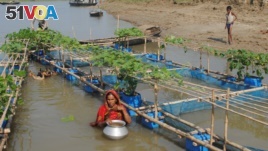Feb 13, 2017
Millions of smallholder farmers in South and Southeast Asia are attempting to diversify beyond staple crops to increase their incomes, nutrition, and resilience in response to climate change and shifting market demand. Although they are potentially significant producers of fresh vegetables and farmed fish, most smallholders lack access to technologies that would help them produce the quantities and quality needed to earn income sustainably. To address this, the U.S. Agency for International Development, or USAID, rolled out its new Feed the Future Asia Regional Innovative Farmers Project at the Agriculture Innovation Summit in Dhaka, Bangladesh January 24th.
Implemented by Winrock International, the regional project will increase food security, reduce poverty, and improve environmental sustainability by facilitating agricultural innovation and technology diffusion in several countries in Asia including Bangladesh.
To disseminate agricultural knowledge and expertise among the Asian countries, this new project will create challenge competitions to discover the most promising technologies, support partnerships and ultimately bring successful tools and practices to farmers in all stages of the supply chain – from productivity to marketing. The Honorable Additional Secretary of Bangladesh's Ministry of Agriculture Musharaf Hossain and USAID Office of Economic Growth Director Matt Curtis spoke at the event.

USAID also announced the winners of the Tech4Farmers Challenge, the very first challenge competition held under the Asia Regional Innovative Farmers Project that sought ways to improve the agricultural productivity and income of small hold farmers in Bangladesh, Cambodia, Myanmar and Nepal.
The winners were the e-Fishery's Smart Fish Feeder, an Indonesia-based technology that combines automatic feeding with sensors and algorithms that sense fish's appetite and adjust the amount of feed to improve efficiency, and the Innovative Spirulina Production, a system created by EnerGaia in Thailand that maximizes algae production with minimal resources, reducing potential for contamination in its bioreactor design and allows spirulina production nearly anywhere. Unlike many challenges, the Tech4Farmers Innovation Challenge did not offer a cash prize, but provided winners the information, business services and access to networks to help expand innovative solutions into new markets in low-income countries.
The U.S. Government, through USAID, has provided more than $6 billion in development assistance to Bangladesh since 1971. The U.S. is proud to work with Bangladesh promote prosperity for the people of the U.S., Bangladesh, and the Asia region.